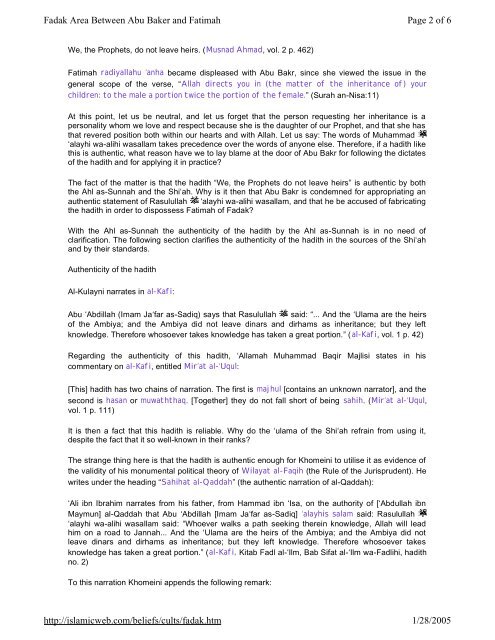Collection Of Articles (Refuting Shia) - Enjoy Islam
Collection Of Articles (Refuting Shia) - Enjoy Islam
Collection Of Articles (Refuting Shia) - Enjoy Islam
You also want an ePaper? Increase the reach of your titles
YUMPU automatically turns print PDFs into web optimized ePapers that Google loves.
Fadak Area Between Abu Baker and Fatimah<br />
Page 2 of 6<br />
We, the Prophets, do not leave heirs. (Musnad Ahmad, vol. 2 p. 462)<br />
Fatimah radiyallahu ‘anha became displeased with Abu Bakr, since she viewed the issue in the<br />
general scope of the verse, “Allah directs you in (the matter of the inheritance of) your<br />
children: to the male a portion twice the portion of the female.” (Surah an-Nisa:11)<br />
At this point, let us be neutral, and let us forget that the person requesting her inheritance is a<br />
personality whom we love and respect because she is the daughter of our Prophet, and that she has<br />
that revered position both within our hearts and with Allah. Let us say: The words of Muhammad<br />
‘alayhi wa-alihi wasallam takes precedence over the words of anyone else. Therefore, if a hadith like<br />
this is authentic, what reason have we to lay blame at the door of Abu Bakr for following the dictates<br />
of the hadith and for applying it in practice<br />
The fact of the matter is that the hadith “We, the Prophets do not leave heirs” is authentic by both<br />
the Ahl as-Sunnah and the Shi‘ah. Why is it then that Abu Bakr is condemned for appropriating an<br />
authentic statement of Rasulullah ‘alayhi wa-alihi wasallam, and that he be accused of fabricating<br />
the hadith in order to dispossess Fatimah of Fadak<br />
With the Ahl as-Sunnah the authenticity of the hadith by the Ahl as-Sunnah is in no need of<br />
clarification. The following section clarifies the authenticity of the hadith in the sources of the Shi‘ah<br />
and by their standards.<br />
Authenticity of the hadith<br />
Al-Kulayni narrates in al-Kafi:<br />
Abu ‘Abdillah (Imam Ja‘far as-Sadiq) says that Rasulullah said: “... And the ‘Ulama are the heirs<br />
of the Ambiya; and the Ambiya did not leave dinars and dirhams as inheritance; but they left<br />
knowledge. Therefore whosoever takes knowledge has taken a great portion.” (al-Kafi, vol. 1 p. 42)<br />
Regarding the authenticity of this hadith, ‘Allamah Muhammad Baqir Majlisi states in his<br />
commentary on al-Kafi, entitled Mir’at al-‘Uqul:<br />
[This] hadith has two chains of narration. The first is majhul [contains an unknown narrator], and the<br />
second is hasan or muwaththaq. [Together] they do not fall short of being sahih. (Mir’at al-‘Uqul,<br />
vol. 1 p. 111)<br />
It is then a fact that this hadith is reliable. Why do the ‘ulama of the Shi‘ah refrain from using it,<br />
despite the fact that it so well-known in their ranks<br />
The strange thing here is that the hadith is authentic enough for Khomeini to utilise it as evidence of<br />
the validity of his monumental political theory of Wilayat al-Faqih (the Rule of the Jurisprudent). He<br />
writes under the heading “Sahihat al-Qaddah” (the authentic narration of al-Qaddah):<br />
‘Ali ibn Ibrahim narrates from his father, from Hammad ibn ‘Isa, on the authority of [‘Abdullah ibn<br />
Maymun] al-Qaddah that Abu ‘Abdillah [Imam Ja‘far as-Sadiq] ‘alayhis salam said: Rasulullah<br />
‘alayhi wa-alihi wasallam said: “Whoever walks a path seeking therein knowledge, Allah will lead<br />
him on a road to Jannah... And the ‘Ulama are the heirs of the Ambiya; and the Ambiya did not<br />
leave dinars and dirhams as inheritance; but they left knowledge. Therefore whosoever takes<br />
knowledge has taken a great portion.” (al-Kafi, Kitab Fadl al-‘Ilm, Bab Sifat al-‘Ilm wa-Fadlihi, hadith<br />
no. 2)<br />
To this narration Khomeini appends the following remark:<br />
http://islamicweb.com/beliefs/cults/fadak.htm<br />
1/28/2005
















